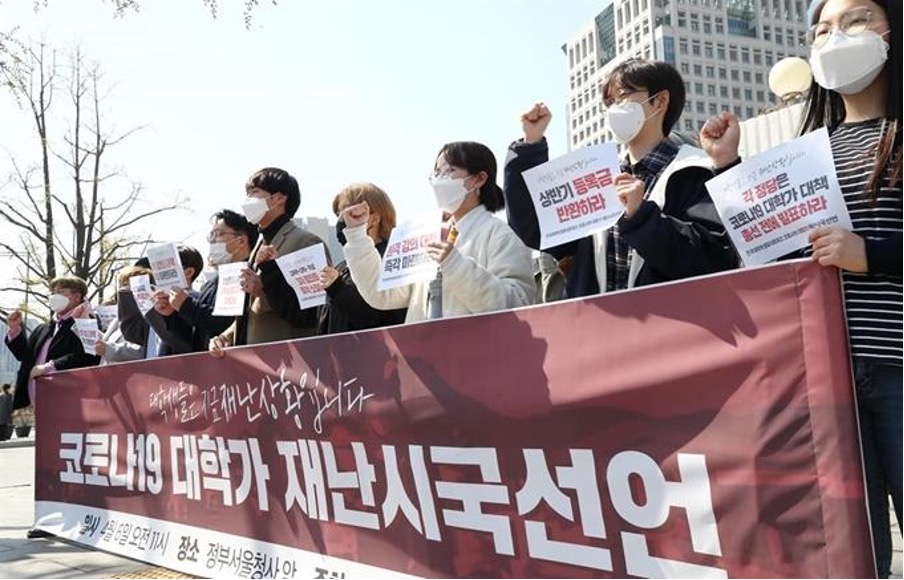 |
| ▲ COVID-19 University Area Disaster Declaration Press Conference Site (Source: Yonhap News) |
Due to COVID-19, most educational institutions across the country have held classes in a non-face-to-face manner since last year. As a result, there are continuous calls for the refund of tuition fees in the university community. The main reason as to why tuition fees should be refunded is because students were not provided with the quality of the classes promised when the tuition was set. Non-face-to-face classes, which mainly use online lectures and real-time video classes, do not offer high quality classes to students. The reasons are based on problems with online sites such as site instability, site random checks, and other shortcomings in non-face-to-face systems; such as excessive submission tasks, frequent reversal of class days, and lack of opportunities for students to actively participate in classes. What is the detailed situation about the tuition refund that has been going on since last year?
Currently, there are two positions divided by the pros and cons over the refund of tuition, which are heated. Students say that tuition fees need to be refunded not only because of the poor quality of the class, but also because there is unspent money due to non-face-to-face classes. Additionally, students claim that they do not use classrooms for non-face-to-face classes, other school facilities such as libraries have been closed and cannot be used. Students' associations from dozens of universities across the country announced descriptionsof their position on refunding tuition fees. However, the Korean Council for University Education replied, "it is difficult to finance universities due to the decrease in the number of school-aged people and it is impossible to refund tuition fees due to the freezing of tuition fees." The government's passive response to the tuition issue is also contributing to the growing voices of students. Students have demanded the refund of tuition fees for months. However, the Ministry of Education dismissed the discussion, saying it was a matter for the university presidents to decide, and did not even set up a forum for dialogue.
In July of last year, about 3,000 university students across the country began a lawsuit to refund tuition fees. However, about a year after the lawsuit began, the court has only held one defense hearing. Some universities pressured students to, "drop the lawsuit", excluding those who participated in the, "refunding of tuition", group lawsuit, when they paid special scholarships to all students. In May, the trial began about 10 months after the complaints about refunding tuition fees were received. On May 6th, the 2021 Tuition Return Movement Headquarters, led by the National University Student Network, held a press conference in front of the Seoul Central District Court. At the press conference, the students said, “students eventually took midterms amid the rehashing of lectures, the quality of lectures were not guaranteed by universities, repeated errors in online server access, and changing face-to-face class measures. The university's headquarters is consistent with the answer that it is being managed well regarding the continuing damage to tuition rights and neglecting online classes.” They also said, “against this backdrop, the, "2021 Tuition Return Movement Headquarters" seeks a just and righteous ruling from the judiciary. As of this trial, the Ministry of Education and the university, which have been working on temporary measures, should no longer postpone their responsibilities to each other but face the demands of college students.”
In June of last year, Konkuk University decided to refund the tuition fee. Konkuk University announced that it had decided to refund 8.3 percent of tuition fees for the first semester. Starting with Konkuk University, students expected universities nationwide to refund tuition fees, but in reality they did not. Other universities have come up with support measures, such as special scholarships, instead of tuition refunds. However, college students say that the name, ‘special scholarship,’ is unreasonable. This is because the school will help students in difficult situations, not just refund tuition fees due to the violation of student rights. In July of last year, Gyewon National University of Art and Design, announced that it would provide special scholarships due to COVID-19 restrictions. The university's President, Song Soo-geun, said, "it is to share the pain of economically challenged students." In response, students said that the university is avoiding their responsibility for the current situation, by only paying a special scholarship.
Many people's daily lives have changed since COVID-19 broke out, and those changes have had a lot of impact on us. Among them, there is a constant debate over various problems arising from the change in the way college classes are taught. Education is not a service. Therefore, the current situation is an important issue, and a reasonable agreement should be reached even through continuous debate. Although the positions of universities and students continue to be at odds, we hope to understand each other's positions while insisting on listening to each other's opinions. We will achieve reasonable results through continuous dialogue and communication in the future.
By Jo Soo-bin, editor-in-chief hyun185415@naver.com
<저작권자 © The Campus Journal, 무단 전재 및 재배포 금지>

 Shrinkflation, Consumer Deception
Shrinkflation, Consumer Deception




